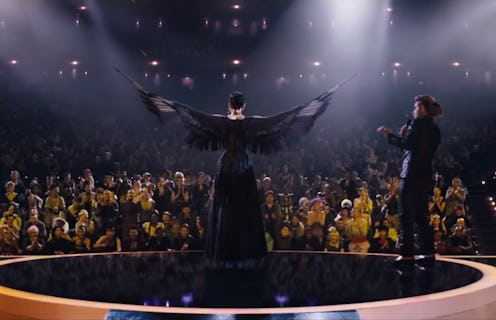
The Hunger Games saga is about many things. It's a love story, a war story, a science-fiction saga about a dystopian future, a coming of age story, etc. But The Hunger Games is also a story about celebrity. The second Katniss volunteers as a District 12 tribute, she becomes an instant star. The reaping, like the Games, was recorded and televised across Panem. And her celebrity status only grows once she enters the Capitol and begins the Games. The Hunger Games is often identified by the love triangle of Peeta, Katniss and Gale, or the violent nature of the plot, but really, the series should be known for exposing the manipulative and isolating nature of celebrity fame.
Celebrity has always been an important part of The Hunger Games. In the first installment, Katniss, Peeta and the other tributes are transformed into glamorous idols before entering the Games' slaughter, in an effort to glorify their actions for the Capitol's benefit. Tributes are given makeovers, and paraded in front of the districts on live television interviews with celebrity announcer Caesar Flickerman. The entire event is shown in both the film and the books to be both extensive and completely faked for the cameras. Katniss' clothes have been artfully designed and picked for her, her answers are practiced, and her demeanor is clearly coached. It's really not unlike a night at the Oscars or a red carpet event. Says Katniss in Suzanne Collins' The Hunger Games,
"And there I am, blushing and confused, made beautiful by Cinna's hands, desirable by Peeta's confession, tragic by circumstance, and by all accounts, unforgettable."
In The Hunger Games, Katniss uses her newfound celebrity to her advantage. She strikes up a fake relationship with Peeta to create a star-crossed lovers story that will entice sponsors to send her help inside the Arena. This, of course, is a commentary on the nature of reality television, imitating the "real" relationships TV viewers obsess over and root for that only exist in front of a lens. And it works. Shows like The Bachelor and Keeping Up With The Kardashians have been on the air for years, selling a heightened version of reality, and the Hunger Games does the same.
It's not just reality television that manipulates people, of course. Those in the public eye, like celebrities and politicians, have a say in the matter, too, and understand the importance of presenting an image to entice fans. It's worth noting that the most popular tweet on Twitter for almost two years was a photo of President Obama hugging his wife after his 2012 victory. Like Peeta and Katniss, the Obamas (or at least their teams) know that love is always good marketing.
So, Katniss' celebrity is, in The Hunger Games , a good thing. It gives her an edge in the Games and helps keep her and Peeta alive. But, it also makes her more of a tool for the Capitol, as demonstrated in Catching Fire. In the second part of the franchise, the Capitol attempts to trade on Katniss and Peeta's love story during their Victors Tour. Their "romance" is put on display in each district of Panem, used as a shinning example of a love that blossomed from the Capitol. Their relationship is simply a PR tool. As Haymitch (Woody Harrelson) tells Katniss in Catching Fire, "Every year they're going to drag you out and broadcast the details of your romance, every year your private life becomes theirs. From now on, your job is to be a distraction, so people forget what the real problems are."
When Katniss and Peeta are sent back to compete in the Hunger Games, Katniss and her Mockingjay pin become less of a tool for the Capitol and more of a symbol for the growing rebellion. The nature of Katniss' celebrity gets more complex. She goes from being a puppet of the Capitol to being one of the rebellion. It might be a cause Katniss believes in, but it's still something she never asked for. At the beginning of Catching Fire, she even suggests to Gale that they escape into the woods. Her goal was never to spark a revolution, but just to protect her family.
What's striking about Katniss' journey in Mockingjay is that she resents her status as a celebrity, but is also aware that it is a necessary evil. To help save Peeta and Panem from the tyranny of President Snow, Katniss is forced to play a part. She dresses up in a special Mockingjay outfit, films propaganda spots and is expected to act according to the whims of President Coin. Her image is still being cultivated and manufactured for a specific purpose that is not her own — like selling tickets to a movie or promoting a beauty brand.
Less than 10 minutes into Mockingjay, Part 1, Plutarch (Philip Seymour Hoffman) dubs Katniss (Jennifer Lawrence) "the face of the revolution," and he's right. After becoming "The Girl On Fire" during her trip to the Hunger Games, our hero doesn't belong to herself anymore. For all the strength and independence Katniss has throughout the series, she is also held captive by her celebrity. Being the symbol of a revolution may be empowering, but it is also stifling. Once she is adopted by the rebels as their leader, a part of her agency disappears.
Despite all the negative aspects that come with celebrity for Katniss and Peeta, their celebrity is also shown as crucial to the revolution that eventually defeats President Snow and ends the Games. In The Hunger Games, celebrity isn't good or bad. It's just necessary.
Images: Lionsgate (4)